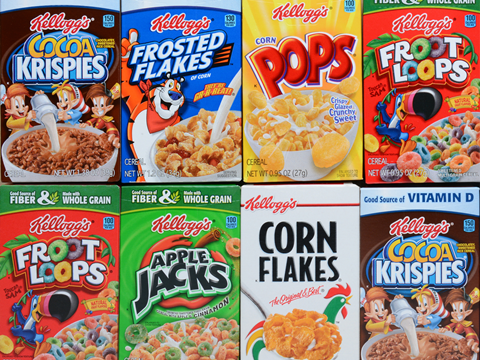
Yesterday, Ferrero revealed that it would acquire WK Kellogg for a total enterprise value of $3.1 billion, taking ownership of its boxed cereal portfolio as rising prices and health trends raise concerns for the product line.
Aiming to expand its product offerings and overall footprint in the United States, Canada, and the Caribbean, Ferrero plans to invest in and grow various WK Kellogg brands. These include a lineup of breakfast cereals: Frosted Flakes, Special K, Froot Loops, Frosted Mini Wheats, and Raisin Bran, among others.
Yet BBC News describes the boxed cereal range as ‘a portfolio facing challenges’ – referring to a suggestion by Reuters that the portfolio has been impacted by high inflation, growing input costs, and increasing health concerns among consumers.
Reuters draws explicit links between WK Kellogg’s declining sales and weak demand and the opposition to food colourings and artificial additives driving secretary of the US Department of Health and Human Services Robert F. Kennedy Jr.’s ‘Make America Healthy Again’ campaign.
Nevertheless, the acquisition is considered part of Ferrero’s pursuit of strategic growth and is anticipated to boost its consumer relevance via the ownership of ‘beloved’ brands.
Ferrero will pay $23.00 per share in cash to acquire all outstanding equity of WK Kellogg. Once the transaction has been completed, WK Kellog’s common stock will no longer trade on the New York Stock Exchange; the company will instead become a wholly owned subsidiary of Ferrero.
WK Kellogg’s Board of Directors has ‘unanimously’ approved of the agreement, but the transaction is subject to approval by WK Kellogg shareowners, regulatory approvals, and other customary closing conditions. The acquisition is expected to close in the second half of this year.
The WK Kellogg Foundation Trust and the Gund Family have entered into agreements in which they commit to vote shares representing 21.7% of WK Kellogg’s common stock, as of 7th July 2025, in favour of the transaction.
Lapo Civiletti, CEO of the Ferrero Group, commented: “WK Kellogg Co, a trusted company with beloved brands, represents a meaningful addition to the Ferrero Group. Enhancing our portfolio with these complementary household brands marks an important step towards expanding Ferrero’s presence across more consumption occasions and reinforces our commitment to delivering value to consumers in North America.”
“Over recent years, Ferrero has expanded its presence in North America, bringing together our well-known brands from around the world with local jewels rooted in the U.S.,” continued Giovanni Ferrero, executive chairman of the Ferrero Group. “Today’s news is a key milestone in that journey, giving us confidence in the opportunities ahead.”
“We believe this proposed transaction maximizes value for our shareowners and enables WK Kellogg Co to write the next chapter of our company’s storied legacy,” added Gary Pilnick, chairman and CEO of WK Kellogg Co.
“Joining Ferrero will provide WK Kellogg Co with greater resources and more flexibility to grow our iconic brands in this competitive and dynamic market.”
“For Ferrero, this deal presents an opportunity to diversify beyond confectionery and deepen its presence in the U.S. market,” Arun Sundaram, analyst at CFRA Research, told Reuters. “Since the spinoff and rebrand from Kellogg Company, both WK Kellogg and Kellanova have delivered shareholder value by becoming acquisition targets.”
In another acquisition between big brand names, Unilever has acquired personal care brand Wild in hopes of making refillable toiletries more accessible to consumers. However, some commentators raised concerns that the brand would lose its focus on sustainability in favour of meeting Unilever’s financial targets.
Greif has also announced that it will divest its containerboard business to Packaging Corporation of America in a $1.8 billion all-cash transaction; this includes its containerboard mills, sheet feeders, and corrugated plants. It hopes to position itself as a packaging leader, deliver more durable earnings, enhance its capital utilization, and reduce recurring capital needs, as well as enable debt reduction and unlock opportunities for value creation.
If you liked this story, you might also enjoy:
The ultimate guide to the Packaging and Packaging Waste Regulation in 2025
How are the top brands progressing on packaging sustainability?
Everything you need to know about global packaging sustainability regulation in 2025
The key to increasing the use of reusable packaging in supermarkets














No comments yet